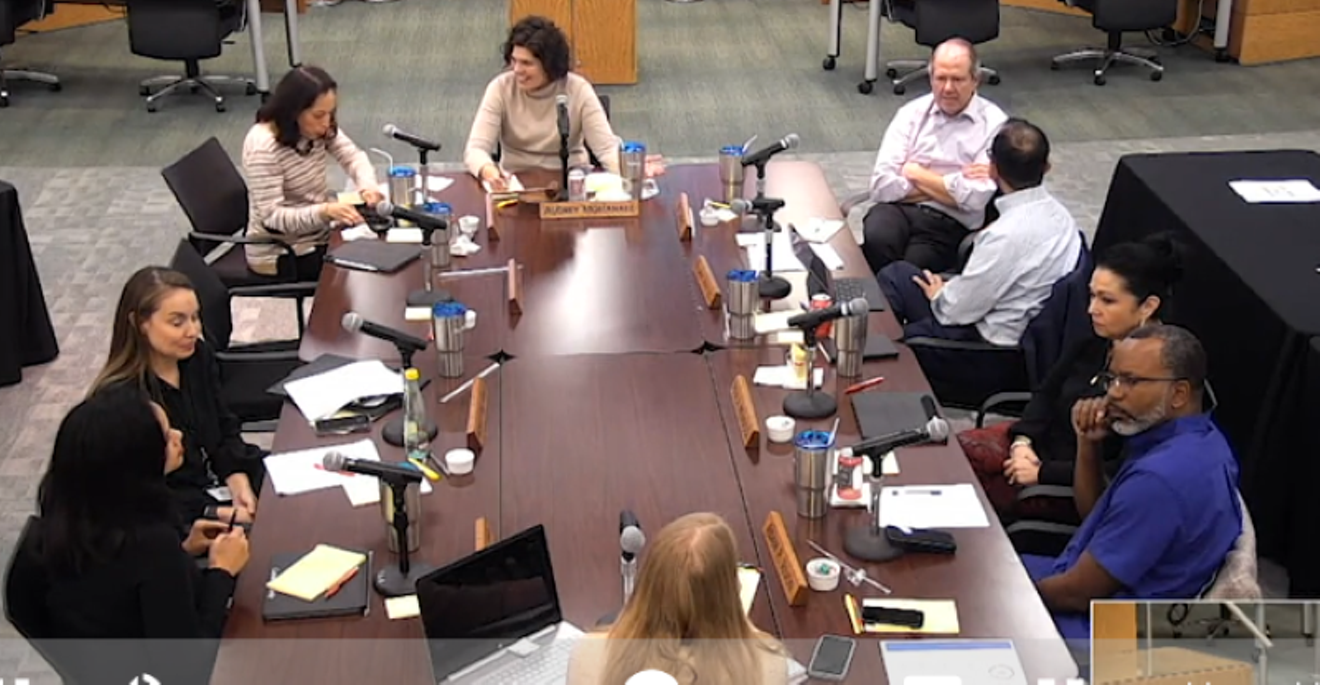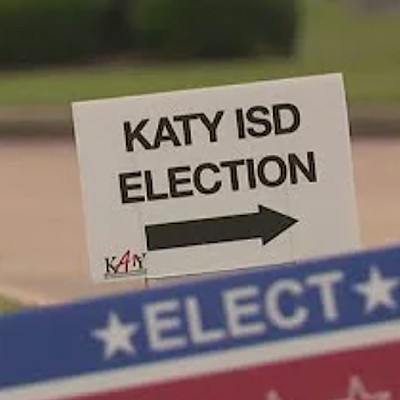An audio recording is circulating of Sharpstown principal Thomas “T.J.” Cotter absolutely screaming at a select group of students about their use of cell phones, earbuds and the wearing of crocs. Violate the policies and they’ll get Saturday detention.
There is nowhere else they can go in Houston ISD where the same rules won’t be enforced, he yells. Miss the assigned detention and if they return without a parent, they might be arrested for trespassing, he threatens.
What a message to deliver to students, many of whom are refugees and immigrants from Latin America, Africa and the Middle East, most of whom do their best to follow rules. Perhaps they take outbursts like this in stride because they come from countries and cultures where this is the norm?
The other irony? According to people at the school, Cotter who was brought in over the summer to replace longtime Principal Dan DeLeon has himself been known to wear casual footwear to school, only changing into more appropriate shoes as needed for visits from administrators. In several of his own posts on X he is shown at school with no socks, other times wearing torn at the knee jeans, and in one case, boasting bright yellow crocs as he puts up welcome balloons.
Superintendent Mike Miles has previously conceded that some of his principals and other administrators might be overzealous in applying his New Education System policies. Is this a case of a principal under pressure overreacting right after he got a visit from central office?
How do we know this happened? Because, of course, people standing there recorded it, a proof-of-an -oh-my-God event that is making the rounds. Have any members of Houston ISD's Board of Managers heard this? Would they do anything about it if they did?
At Betsy Ross Elementary critics opposed to it opting into the NES program fear they’ll lose their magnet classes. The district said all the families would be surveyed but it seems that hasn’t happened and anyhow, whatever the results are, only the principal will see them. That principal will be the only one to decide whether to apply for the program for 2024-25, no matter any other information collected, they’ve been told in writing by the District Superintendent Dr. Luz Martinez. Who's listening to their concerns?
Over at Westbury High School, still reeling from its low marks when the district recently did its own academic accreditation ratings, parents are scared they’ll lose their vaunted counseling program that’s received a national award once they become part of NES. What do they do? They post their worries on Facebook.
Any school district always has a certain amount of angst going on at any time among parents and staff but with what seems to be a record-setting amount at HISD right now, where can parents appeal to?.
In years past, parents, school staff and communities would take their complaints to the administration yes, but equally if not more so to individual members of the elected school board. They’d get on the phone, write letters and emails, stop trustees when they were in the area and share their concerns. Trustees were elected to represent their interests.
It’s different now. Superintendent Miles and his administration are charged with doing all the fixing. The Board of Managers are supposed “to govern” they’ve been told. They set policy and see that the superintendent carries it out. It is a distanced approach that (we hope) keeps them away from direct intervention with vendors but gives the public little additional access to getting their complaints listened to.
Board members remain cyphers in many respects, known mostly for their unanimous, unexplained votes — a frustrating situation for many in the community.
There is a way to get to know them. It involves watching them go through the kind of group exercises that can be tedious to endure but are oh so revealing about what they think now and where they are heading.
If they won’t talk about much of anything at their board meetings, attend a board workshop and get more than a glimpse of what these trustees are about. Listen and don’t interrupt with words of wisdom from the floor. Not because you don’t have anything worthwhile to say. You do.
But you already know what you think. They already know what you think. The point is to learn what and how they think.
The workshop work
Last week’s workshop meeting designed to help Board of Managers members become better at their volunteer jobs, was encouraging at several points, less so at others, and occasionally heavy organ music seemed to be playing in the background.The sessions, open to the public (but so far almost no one attends), are designed to help them set standards for themselves and presumably for future boards . They do consider serious topics but completely avoid any of the daily controversies going on districtwide. There are no discussions about all the kids walking out of Madison High protesting the new cell phone policy or the worth of the NES program or the number of teachers leaving the district or parents upset at the prospect of losing magnet classes.
On February 1, eight of the nine board members (Angela Flowers was missing) sat in a nearly vacant room and what followed was refreshingly open and light years from their board meetings.
On the plus side, Board President Audrey Momanaee recognized that many people can’t come to their meetings that start at 5 p.m. on a Thursday. She then veered into a discussion of access vs. transparency, suggesting it might be better to have a Q &A sheet that anyone could read in 10 minutes instead of having people “slog through “ meetings of three hours or more.
Rolando Martinez suggested the board meetings could be moved around the district to make them accessible to more people. He also called for meeting notices to be posted sooner than the required 72 hours so more people would have time to see the documents, “in light of the fact we no longer have agenda review.” (And why is that?)
They pledged themselves to transparency and an adherence to the Public Open Meetings Act. The latter hit a bump later in the meeting, however, when different board members talked fondly about meeting in threesomes “pods” in early days to discuss what was on the upcoming agenda and wouldn't that be nice to resume.
Except that's a violation of the open meetings law as Board attorney Catosha Woods promptly told them. All discussions of matters on the agenda should be done as a group in open meetings, she said. Oh.
There were candid remarks about how long board meetings should be (two hours max!), whether video recordings made of lengthy meetings have any worth (does anybody watch them?), and a call for more decorum (applicable to the room at large) in board meetings.
The Board of Managers talked quite a bit about holding each other accountable. If this means that they hold each other to ethical behavior and don’t turn a blind eye to illegal behavior then by all means, they should be commended for saying this is imperative. And something if done by previous boards might have resulted in a very different, less troubled and less corrupt HISD board history.
But as discussion progressed it seemed that to Janette Garza Lindner and Michelle Cruz Arnold more accountability actually was synonymous with "decorum." Both have been very concerned about this.
“Wanting to protect the level of decorum in the board room because students are watching the board meetings and we want to make sure that students can watch the board meetings," Arnold explained. "And parents can let their students watch the board meetings without reservation. So we’d like to protect that spirit of decorum if possible.” Wow, public meetings held to a PG rating level?
When asked after the meeting if she meant just the board members or the audience too, she said both. While probably no one wants a return to the mud-slinging days of one trustee attacking another, if decorum equates with little to no public disagreement, that’s when the creepy, something-is-not-right feeling starts to tug away at onlookers.
If a call for more decorum applies to the audience, then we’re in tricky, slippery slope land. Walking the line between free speech and personal attacks is always difficult, but should a board, elected or appointed, be the sole determiner of what is appropriate? Following a recent board meeting when some really nasty signs were hoisted by audience members attacking Superintendent Miles, HISD in a special bit of overkill, has stipulated that no banners or signs can be erected during a meeting.
Martinez briefly wondered if they shouldn’t address some of the complaints brought up at meetings, followed by his quick acknowledgement this would be difficult to do and hold a meeting to two hours. Adam Rivon suggested the board explore some additional ways of reaching out to the public to explain its policies.
The workshop trainer Ashley Paz told the group that it was important that members of the public feel they can speak up without fear that they are jeopardizing their social status. She applauded them for their willingness to listen to the community. Everyone gave the amens, but a recurring theme at board meetings is a member of the audience saying they are speaking on behalf of a teacher who is afraid to do so out of fear of retaliation. Who has ever contradicted that?
Anyhow, the security-to-speak issue somehow morphed into Arnold’s complaint that people she knows are afraid to attend the meetings because they support the administration and its programs and worried that speaking out will lead to them being heckled.
Board member Ric Campos, known for his businesslike, occasionally impatient, approach to the ground a school board needs to cover doing its business, argued that meetings should last only about two hours. Longer than that, board member Campos declared, and people just aren’t listening. “You can’t watch a four-hour meeting. They’re also not going to watch it online later.” Again, nods all round and Paz topped it off by saying there is a huge body of research showing that after the first 120 minutes of any kind of engagement there is a sharp decline in cognitive engagement aka people paying attention.
You can certainly have board meetings that last longer than that, but the quality of decision making declines accordingly, she said.
A further argument was advanced that by having long meetings, candidates for an elected school board would be discouraged from applying knowing it would be too time-consuming. History would indicate otherwise; it’s one of those observations that sounds helpful and logical, whether it is or not. And best filed under patronizing and condescending.
With meetings that are often filled with an hour’s worth of speakers first (although that may be changing as several people have commented in recent meetings that it is a waste of time because the board and its superintendent aren’t listening to them) you wouldn’t have much left.
We already have a board that – to put it in math standardized testing terms – doesn’t show its work in how it has reached its conclusions. It takes mere moments to vote unanimously on its consent agenda. From this workshop meeting it appears its well-intended efforts to explain itself to the community will be codified and placed on the HISD website, available to anyone with a computer. Who knows where to look.
Communicating how?
Right now there are informational meetings going on throughout the district letting parents at NES schools and potential NES schools know about the program with a Q&A session at the end. These meetings are kept to a tight one-hour schedule and as parents at Betsy Ross discovered, when the administrators say it’s over, it’s over."It's not just at Betsy Ross. HISD is giving the principals what to say about NES schools and its very positive," one teacher said. It's what is getting left out that has this teacher and some parents concerned.
This is a school that has a lot of volunteer groups come in during the day, which won't be allowed with NES until after classes end for the day, the teacher said. Parties have to be before school, after school or at lunch. "Nobody's going to be eating pizza and drinking soda at 6:30 in the morning."
Extending the school day with programs after classes may clash with parents on a tight pickup schedule, the teacher said. Bringing in food at lunch time puts it in competition with the lunch being served at the cafeteria. All in all, the teacher said. the new policy doesn't work and shuts out volunteers who have been coming to the school for years. "It's like you can swim but don't get wet."
Betsy Ross parent Eugenio Saenz decided to keep going after the mics were shut off at the informational meeting as he attempted to persuade the school’s principal Chandra Reed not to apply for the program.
But as an audio of her introductory remarks shows, she has already bought into the idea of “high quality instruction” and the added support that signing on for NES she believes will bring to her campus. Saenz, perhaps unfairly, questioned whether it was the program itself or the huge bump in pay she would receive by becoming an NES principal. Saying she was a role model for the students, he urged her not to sacrifice “that level of influence and trust for money.”
Will the library donated by former NBA All-star Tracy McGrady disappear from the school, Saenz wants to know. Will the STEM (science, technology, engineering and math) program vanish with the arrival of NES and its rigidly prescribed lesson plans and slides delivered to teachers from a central office?
Tonight, at the board's regular 5 o'clock meeting the board will set the school calendar for the next year. They will approve vendor awards of more than a million dollars. They will decide whether to pay staffers who missed work on January 16 when the schools were closed for the freeze. They will amend policies and review their latest goal progress report.
But they probably won't talk about the issues that many of their constituents want to hear them discuss. At least it'll be a relatively short meeting.







